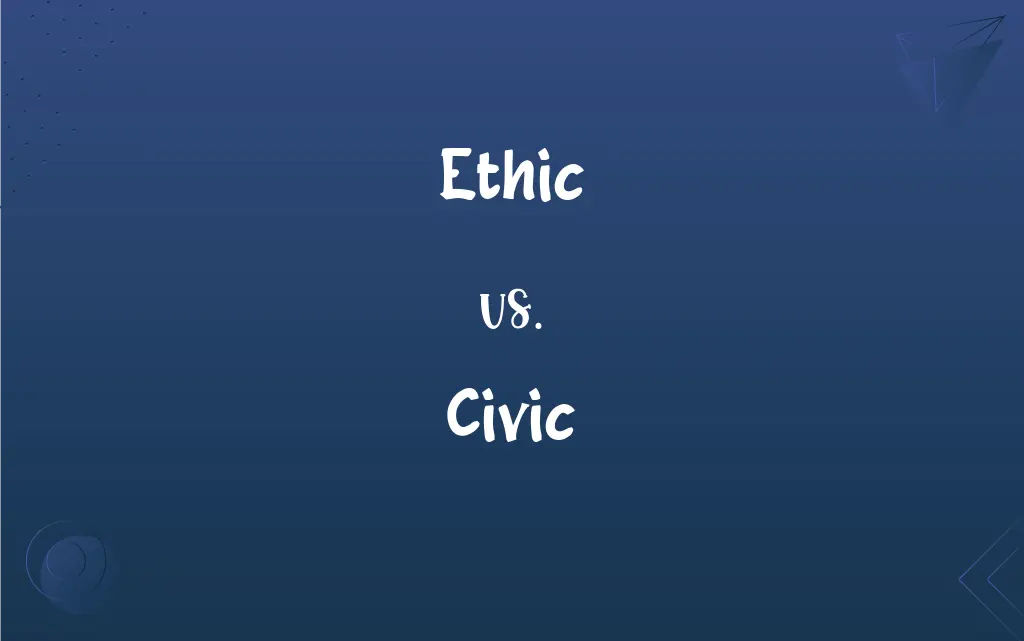Ethic vs. Civic: What's the Difference?
By Harlon Moss & Aimie Carlson || Updated on May 24, 2024
Ethic refers to moral principles guiding individual behavior, whereas civic relates to duties and responsibilities associated with citizenship and community involvement.

Key Differences
Ethic encompasses the moral principles and values that guide an individual's behavior and decision-making. For instance, an ethic might involve honesty, integrity, and fairness in personal and professional conduct. Civic, on the other hand, pertains to the duties, rights, and responsibilities of a citizen within a community or society. Civic duties include voting, community service, and participating in civic activities to promote the common good.
Ethic involves internal values and moral judgments about right and wrong. Ethical behavior is often driven by personal beliefs, societal norms, and professional standards. Civic engagement, however, focuses on participation in the public sphere and fulfilling roles that contribute to the functioning and improvement of society. Civic responsibilities are often defined by laws, regulations, and social expectations.
Ethic can be subjective and vary significantly between cultures, religions, and individuals. For example, what is considered ethical in one culture might be viewed differently in another. Civic responsibilities, while they can vary between countries, are generally more standardized within a given society. They often include activities like paying taxes, obeying laws, and serving on juries.
In professional settings, ethic refers to the codes of conduct and principles that govern behavior within a specific profession. These ethical standards help ensure trust, accountability, and integrity in various fields. Civic responsibility in a professional context might include contributing to community projects, participating in local governance, or supporting civic initiatives.
Ethic involves a broader spectrum of moral philosophy and personal conduct, encompassing various aspects of life and different contexts. Civic is more narrowly focused on the relationship between individuals and their communities or societies, emphasizing collective action and social responsibility.
ADVERTISEMENT
Comparison Chart
Definition
Moral principles guiding individual behavior
Duties and responsibilities associated with citizenship
Focus
Personal values and moral judgments
Participation in public life and community involvement
Scope
Internal values, often subjective
External responsibilities, often defined by laws
Professional Context
Codes of conduct and principles in professions
Engagement in community projects and local governance
Cultural Variation
Varies significantly between cultures and individuals
Generally more standardized within a society
ADVERTISEMENT
Ethic and Civic Definitions
Ethic
Moral principles guiding individual behavior.
His strong work ethic earned him the respect of his colleagues.
Civic
Pertaining to a city or community.
The civic center hosts many community events.
Ethic
A set of moral issues or aspects.
The ethical implications of the decision were carefully considered.
Civic
Related to municipal administration.
Civic leaders play a crucial role in local governance.
Ethic
A system of moral principles.
The company follows a strict ethic of sustainability.
Civic
Pertaining to citizenship and public affairs.
Civic education is essential for a functioning democracy.
Ethic
Guiding beliefs or ideals.
The ethic of honesty was central to their business practices.
Civic
Relating to the duties and activities of citizens.
Voting is a fundamental civic responsibility.
Ethic
A set of principles of right conduct.
Civic
Involving participation in public life.
Civic engagement includes activities like volunteering and attending town meetings.
Ethic
A theory or a system of moral values
"An ethic of service is at war with a craving for gain" (Gregg Easterbrook).
Civic
Of, relating to, or belonging to a city, a citizen, or citizenship; municipal or civil.
Ethic
Ethics (used with a sing. verb) The study of the general nature of morals and of the specific moral choices to be made by a person; moral philosophy.
Civic
Of, relating to, or belonging to a city, a citizen, or citizenship; municipal or civil.
Thousands of people came to the Civic Center to show off their civic pride.
Ethic
Ethics (used with a sing. or pl. verb) The rules or standards governing the conduct of a person or the members of a profession
Medical ethics.
Civic
Of or relating to the citizen, or of good citizenship and its rights and duties.
Civic duty
Ethic
Moral, relating to morals.
Civic
Relating to, or derived from, a city or citizen; relating to man as a member of society, or to civil affairs.
Ethic
A set of principles of right and wrong behaviour guiding, or representative of, a specific culture, society, group, or individual.
The Protestant work ethic.
I think the golden rule is a great ethic.
Civic
Of or relating or belonging to a city;
Civic center
Civic problems
Ethic
The morality of an action. en
Civic
Of or relating to or befitting citizens as individuals;
Civil rights
Civil liberty
Civic duties
Civic pride
Ethic
Of, or belonging to, morals; treating of the moral feelings or duties; containing percepts of morality; moral; as, ethic discourses or epistles; an ethical system; ethical philosophy.
The ethical meaning of the miracles.
Ethic
The principles of right and wrong that are accepted by an individual or a social group; as, the Puritan ethic.
Ethic
A system of principles governing morality and acceptable conduct.
Ethic
The principles of right and wrong that are accepted by an individual or a social group;
The Puritan ethic
A person with old-fashioned values
Ethic
A system of principles governing morality and acceptable conduct
Ethic
The discipline dealing with what is good and bad.
She studied medical ethics to better understand patient care.
FAQs
What does civic mean?
Civic relates to the duties and responsibilities of a citizen within a community or society.
How do ethics influence behavior?
Ethics influence behavior by providing a framework for determining what is right and wrong.
How are ethics applied in professional settings?
Ethics in professional settings are applied through codes of conduct and principles that ensure trust and integrity.
What is the relationship between ethics and law?
Ethics and law can overlap, but ethics are moral principles, while laws are rules enforced by a society.
What does ethic mean?
Ethic refers to moral principles that guide an individual's behavior and decision-making.
What are some examples of civic responsibilities?
Examples of civic responsibilities include voting, paying taxes, and participating in community service.
Can ethics vary between cultures?
Yes, ethics can vary significantly between different cultures, religions, and individuals.
Are civic responsibilities the same in every country?
Civic responsibilities can vary between countries but are generally standardized within each society.
What is civic engagement?
Civic engagement involves participating in activities that contribute to the functioning and improvement of society.
What is the role of civic education?
Civic education aims to inform individuals about their rights and responsibilities as citizens.
Can ethics change over time?
Yes, ethics can evolve over time as societal norms and values change.
How does civic engagement benefit communities?
Civic engagement benefits communities by promoting active participation, improving governance, and fostering social cohesion.
How do ethics relate to personal values?
Ethics are closely related to personal values, shaping how individuals perceive right and wrong.
How do civic responsibilities relate to citizenship?
Civic responsibilities are an essential aspect of citizenship, defining the roles and duties of individuals within a community.
Is ethic focused on personal or public life?
Ethic is focused on personal life, guiding individual behavior and decision-making.
Can civic responsibilities change over time?
Yes, civic responsibilities can change as laws and societal expectations evolve.
How does ethics influence professional conduct?
Ethics influence professional conduct by establishing standards for behavior, ensuring accountability and integrity.
Are ethics always legally binding?
No, ethics are not always legally binding, but they guide moral behavior and professional standards.
Is civic focused on personal or public life?
Civic is focused on public life, emphasizing participation in community and societal activities.
Are civic duties always legally binding?
Many civic duties, such as paying taxes and serving on juries, are legally binding.
About Author
Written by
Harlon MossHarlon is a seasoned quality moderator and accomplished content writer for Difference Wiki. An alumnus of the prestigious University of California, he earned his degree in Computer Science. Leveraging his academic background, Harlon brings a meticulous and informed perspective to his work, ensuring content accuracy and excellence.
Co-written by
Aimie CarlsonAimie Carlson, holding a master's degree in English literature, is a fervent English language enthusiast. She lends her writing talents to Difference Wiki, a prominent website that specializes in comparisons, offering readers insightful analyses that both captivate and inform.































































